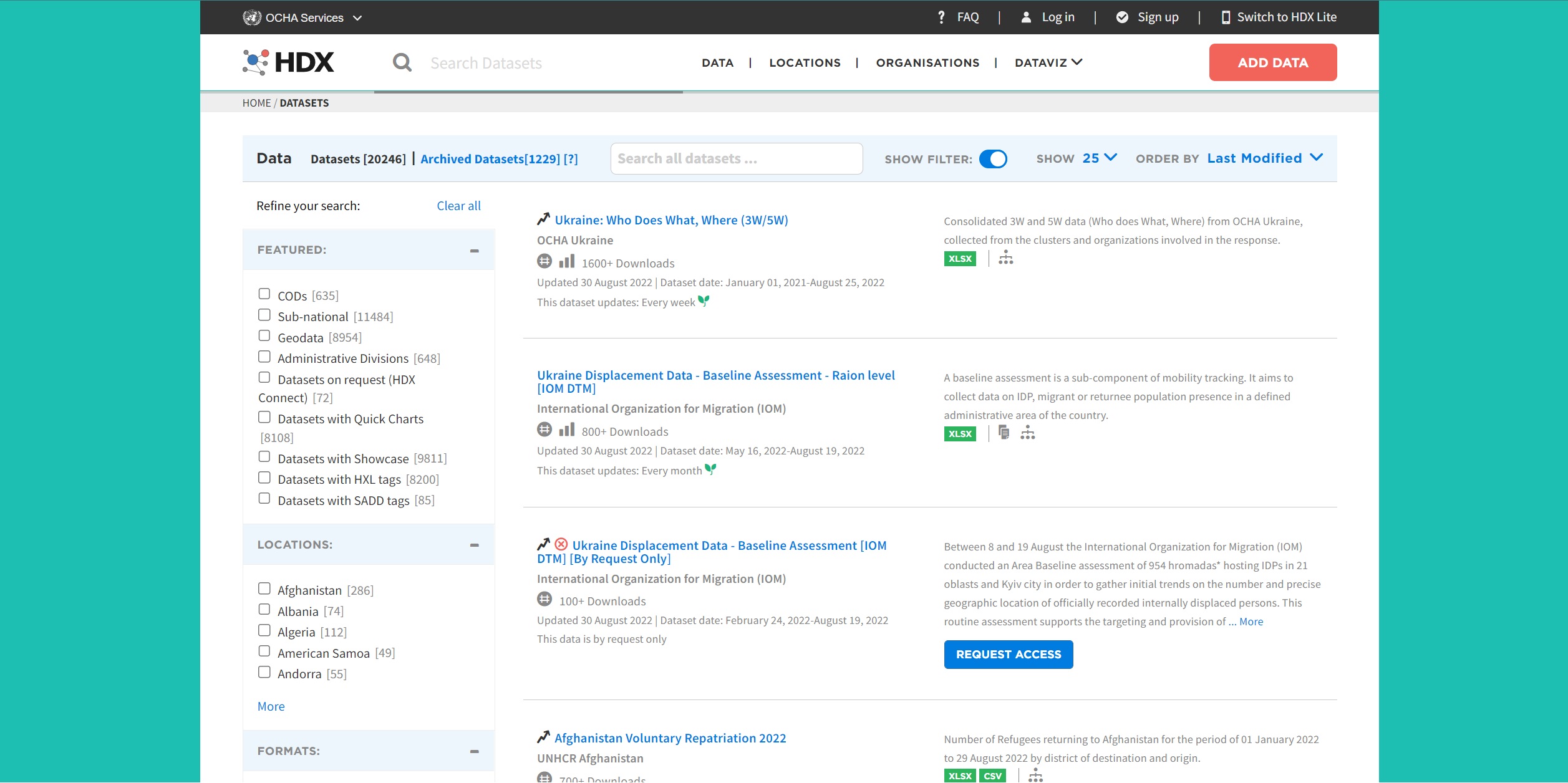Introducing the Humanitarian Data Exchange (complete)
An overview of the Humanitarian Data Exchange - what it is, how to use it, and how the African Data Hub engages with it.
- Introduction
- Types of Data Available on HDX
- How to access and search for data on HDX
- How ADH uses HDX data
- Conclusion
Introduction
The Humanitarian Data Exchange (HDX for short) is an open, online platform for sharing data across countries and organisations. It was launched in 2014 with the aim of making humanitarian data easy to find and explore, however, with currently more than 20 000 datasets on the platform, it can be a little intimidating for new users and it is easy to get lost! The purpose of this blogpost is to provide an overview of what kind of data is available on the HDX platform, how to search for the data you want, how to access it and how we at ADH interact with HDX data. If you are already familiar with HDX and have some specific questions, you may want to dive straight into their FAQ.
The HDX platform runs on CKAN, an open source data management system that is used by hundreds of organisations around the world such as our ADH data repository, and various national governments including USA, Canada, Singapore, Australia and others.
When using CKAN, it is important to understand the difference between the system's definition of a dataset vs a resource. A dataset is a collection of related data resources, while a resource is a single file. It may be useful to think of a dataset as a folder on your computer and a resource as a file in that folder.
Types of Data Available on HDX
HDX data is available in a wide variety of formats, from spreadsheets (eg: XLSX, CSV) to geographic (eg: SHP, geoJSON) to image (eg: geoTIFF, PNG) and even documents like PDF, DOCX, and PPTX. Some datasets will include the same data in different formats under different resources. It is therefore not always necessary to download an entire dataset, but rather, only look for formats that you are comfortable with or are able to use. Different formats of data are also often different sizes. For a tutorial on exploring an HDX dataset with different formats of the same data, see here ENTER PUBLISHED LINK HERE.
How to access and search for data on HDX
Searching for datasets on HDX is done in two ways: by searching for terms that you type into the search bar found at the top of almost every page on HDX, and by filtering a list of search results. The HDX search webpage can be found here and a screenshot of the same is shown in figure 1.
Entering a search term causes HDX to look for matching terms in the titles, descriptions, locations and tags of a dataset. This is very similar to searching for something on Google. The resulting list of items can be further refined using the filter options on the left side of the search result. You can filter by location, tag, organisation, license and format as well as filtering for some special classes of datasets.
Once you have narrowed your search down to a manageable list of datasets, you need to click on one and see if it contains any resources that you wish to use. You can download any resource by clicking on the download button to the right of the resource. As noted above, pay attention to the format of the resource that you wish to download and ensure that you download it in the correct format.

HDX have a suite of data visualisation tools that will enable you to explore many of their datasets. It is usually possible to then download the data that fed the visualisation.
How ADH uses HDX data
The African Data Hub has its own CKAN data repository. The main aim of the ADH data repository is to provide accurate, up-to-date data on African countries. This repository is described in this ENTER PUBLISHED LINK blog post. The ADH data repository contains many datasets that are hosted on the HDX platform. The HDX platform has a global focus, while ADH has an African focus, thus it is our intention to highlight HDX's African datasets and make them easier to find as our repository holds significantly fewer than 20 000 datasets. The HDX African datasets that we have on our repository can be found here. In most cases, we simply provide the URL to where the data is hosted on the HDX platform, as there is little sense in hosting and maintaining those datasets ourselves.
Conclusion
The Humanitarian Data Exchange is a brilliant global, opensource, online data respository with thousands of datasets covering a wide range of humanitarian and crisis-related topics. As a data journalist, it is well worth the effort to spend some time familiarising yourself with it. The African Data Hub has an opensource, online data repository with an African focus that is continually growing. If you are looking for data from African countries, it could be worth looking on the ADH data repository first before searching through HDX as we may have found it already.